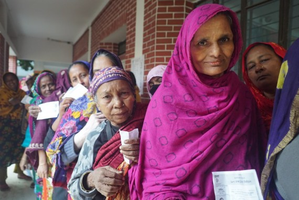Power transition in Bangladesh leaves question of electoral legitimacy dangling: Report
By IANS | Updated: August 31, 2025 19:50 IST2025-08-31T19:47:58+5:302025-08-31T19:50:21+5:30
Muscat, Aug 31 Bangladesh's former Prime Minister Sheikh Hasina's departure has ushered in an interim administration under Nobel ...

Power transition in Bangladesh leaves question of electoral legitimacy dangling: Report
Muscat, Aug 31 Bangladesh's former Prime Minister Sheikh Hasina's departure has ushered in an interim administration under Nobel laureate Muhammad Yunus. For a nation having fierce rivalry between the Awami League and the Bangladesh Nationalist Party (BNP), this abrupt change has not only disrupted established political norms but also raised question over electoral legitimacy, a report has said.
Hasina’s presence provided a strange form of political stability in Bangladesh. However, her dominance left little room for ambiguity about where power rested. Her exit from Bangladesh following massive student-led mass protests in 2024 and the absence of that overwhelming authority has left a vacuum that no institution or leader appears ready to fill.
In a report, Times of Oman stated, "For a nation accustomed to the fierce rivalry between the Awami League (AL) and the Bangladesh Nationalist Party (BNP), this sudden transition has not only disrupted entrenched political patterns but also left the question of electoral legitimacy dangling over a volatile landscape. The prospect of holding a free and fair election in this unsettled atmosphere appears increasingly daunting, burdened by decades of mistrust, institutional decay, and the sheer weight of political violence that has scarred the nation’s democratic aspirations."
Yunus is an outsider in the world of Bangladesh politics. His ascension to the power has been met with scepticism from both political parties. For the Awami League, Yunus represented a betrayal, someone who took over power after Hasina's exit under international pressure. For the BNP, Yunus is not a saviour but a technocrat who has no political constituency. For BNP, he is a temporary figure whose presence only delays the party's goal of restoring power.
In a report, Times of Oman stated, "In such a climate, it is unclear whether Yunus possesses the authority, political network, or grassroots legitimacy to ensure a credible electoral process. Bangladesh’s institutional weakness compounds the crisis. The Election Commission, already mistrusted after its role in overseeing widely disputed polls, remains deeply compromised. Civil services and law enforcement agencies, long accused of partisan loyalty to Hasina’s government, now find themselves caught between a fragile neutrality and the temptation to maintain old allegiances."
"In such a context, even the promise of a neutral caretaker government—a model that historically provided some measure of trust during transitions—rings hollow. Yunus’ interim administration lacks the deep political machinery required to wrest control of the electoral apparatus from actors loyal to partisan masters. That deficiency makes the task of staging a genuinely free election appear less like an opportunity for democratic renewal and more like an invitation for deeper conflict," the report said.
BNP supporters are eager to reclaim space while Awami League supporters, fearful of retribution, remain unwilling to concede without resistance. The report said: "The danger is that under Yunus’s leadership, without the muscle of a strong political organisation, the interim government may find itself unable to contain this simmering competition. Electoral campaigns, rather than being exercises in democracy, may instead become violent battlegrounds where each side seeks to demonstrate dominance through force rather than ballots."
Bangladesh has a history of street protests and extra-parliamentary agitation. With election set to be held under Yunus' interim rule, the streets of Bangladesh are likely to again become the main theatre of politics. Reports have emerged regarding clashes between student wings, union groups, and local cadres of Awami League and BNP.
In a report, Times of Oman stated: "If the BNP perceives that Yunus is leaning, however unintentionally, toward retaining AL influence in the electoral framework, it may resort to boycotts or violent agitation, as it has done in the past. Conversely, if AL fears being dismantled through a fair contest, it may mobilise its vast grassroots machinery to intimidate voters, disrupt polling, and delegitimise the process. The result could be an election marred not only by irregularities but by widespread bloodshed, with the interim government reduced to a passive observer."
"Bangladesh’s future under Muhammad Yunus’s interim leadership is defined by contradictions. On paper, the moment represents an opportunity to reset the country’s democratic trajectory after years of 'authoritarian drift' under Hasina. In practice, the reality looks far bleaker. The combination of institutional weakness, partisan polarisation, street-level violence, and external meddling makes the task of holding a free and fair election nearly impossible," it added.
Disclaimer: This post has been auto-published from an agency feed without any modifications to the text and has not been reviewed by an editor
Open in app